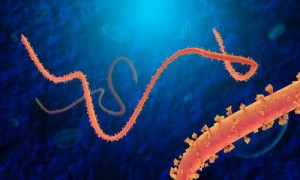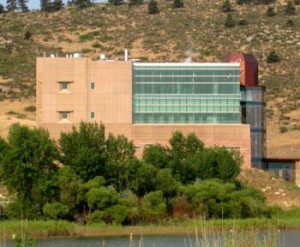Imagine traveling nearly 5,000 miles to a place where 70 percent of the population lives in poverty.
Imagine working on the front lines of one of the worst outbreaks of one of the planet’s deadliest diseases, witnessing the heartbreak on the faces of those impacted by Ebola.
Imagine volunteering to do it, knowing that your life will be at risk every day.
‘My parents questioned my sanity’
Now you know what two Colorado State University alumni experienced as part of Center for Disease Control’s Team 5 when they spent November and part of December in Bo, Sierra Leone, testing thousands of blood samples for the presence of Ebola.
“I have to say, my parents did question my sanity,” said Brandy Russell, who volunteered to be part of a team working in Bo, Sierra Leone, testing thousands of blood samples for the presence of Ebola. “But when this opportunity came up I jumped at the chance. I don’t get to do much field work, and I wanted the chance to see how public health works on the front lines.”
Russell, who works in the CDC lab in Fort Collins, and Tara Sealy, a CSU alum who works in the agency’s Atlanta office, made up two of the four members of Team 5. Together they formed the first – and to this point, only – all-female team to run the CDC’s Ebola testing lab on the front lines of the epidemic in Bo.
Record-setting team
Team 5 set records for the most Ebola samples processed in one day (162); the most samples tested in 21 days (2,012); and the most samples tested in 28 days – about 2,700. The records still stand.
“It was really a good team,” Sealy said. “I had worked with two of the women (Angie Sanchez and Aridth Gibbons) in Atlanta, but none of us knew Brandy, who was a volunteer. We made a really good team both in the lab and in our down time. It was a real honor to work with them.”
Falling in love with microbiology at CSU
Sealy’s journey to Sierra Leone was almost predestined. After graduating from Douglas County High School in Castle Rock, she came to CSU in 1999 to study microbiology, quickly falling in love with the program.
“The microbiology department at CSU was fantastic,” she said. “I learned a lot of really valuable lessons, and I had some great professors. Erica Suchman (a professor of microbiology) is a great teacher and really got me enthusiastic about microbiology.”
Sealy was introduced to the Fort Collins CDC lab as a work study, researching the plague. She was hired to a full-time position after graduating in 2002, then transferred to the CDC’s headquarters outside Atlanta, where she studies viral special pathogens such as Ebola.
Extensive work on the front lines
She did field work in Angola during a Marburg virus outbreak in 2005, and has since made several trips to Uganda for Marburg outbreaks. She has also spent time in Guinea doing Ebola testing.
She first traveled to Sierra Leone in August, spending four weeks doing testing as part of a three-member team in Kenema, the third-largest city in Sierra Leone. That’s when she realized a dream she’s had for many years.
“I’m sure it sounds a little crazy, but this is what I’ve always wanted to do: work on the front lines of a major outbreak of Ebola in Africa,” she said. “I wanted to be able to help people in a time of crisis while studying this disease.”

Fort Collins CDC lab links CSU alums
Russell and Sealy didn’t know each other at CSU, although they figured out that they had probably shared a class or two. Russell majored in biology, which is part of the College of Natural Sciences, while microbiology is part of the College of Veterinary Medicine and Biomedical Sciences, so their paths didn’t often cross during their three years together on campus.
After growing up in Ohio, she came to CSU hoping to become a veterinarian but quickly discovered a love for research. In her spare time she worked for the Office of Admissions and gave campus tours to prospective students.
“I got a great education at CSU,” she said. “I got my degree in biology but I also really enjoyed my classes in microbiology.”
She worked at Heska, a Loveland-based veterinary testing lab, during college, and started working at the CDC’s Fort Collins lab after graduating in 2003.
Excited to work in the field
Her day-to-day duties include testing arbovirus samples and studying a recent outbreak of chikungunya in the Caribbean. Field work is not usually part of her job, so she jumped at the chance to volunteer for a stint in Sierra Leone.
“I don’t get the opportunity to do much field work, and seeing public health at work on the front lines was really interesting,” Russell said. “When you work in public health, it’s a big deal to be part of a global response, and I was happy to be able to contribute.”
 Rapid lab testing in the field is a critical component in the battle against epidemic.
Rapid lab testing in the field is a critical component in the battle against epidemic.
It allows people who are Ebola-free to receive appropriate treatment for their true condition – and to leave group isolation where they might catch Ebola from an infected person – and it gets people with Ebola into early treatment. Also, it can confirm when people who survive Ebola become virus-free and may be released from treatment units.
Long days, challenging conditions
Life in the field, however, is anything but glamorous. Team 5 worked 28 consecutive days, testing blood samples for up to 13 hours daily. Electricity in the Doctors without Borders compound outside Bo often failed, and wasps buzzed round the workers throughout the day.
The protective suits worn by all workers turned the lab into a sauna, and the team members left the compound on several occasions around 9:30 p.m. realizing they hadn’t had time to eat dinner.
Making an impact
Still, they relished the chance to help the people in their desperate battle against the deadly virus. And their production was remarkable. During Sealy’s first 28-day stint in Sierra Leone in August, her team averaged 25 blood tests daily. In November, when the outbreak was at its peak, Team Five tested an average of 98 samples daily.
“It was definitely an eye-opening experience,” Russell said. “You would see eight or nine samples from the same household; it was really heartbreaking to see that kind of devastation in one house or one village.
“The days definitely were long but you knew you were accomplishing something incredibly important. You knew you were having an immediate impact on lives by doing that testing throughout the day.”
Cruel disease
While Team 5’s time was spent exclusively in the lab, Sealy got to interact with some patients during her August trip. That’s when she gained an appreciation for Ebola’s ability to devastate.
“One day a 9-month-old baby came in, and both her parents were already dead,” she said. “Another woman who was caring for her was five months pregnant, and I still wonder what happened to that baby. A lot of children don’t go home with their parents, so there’s a lot of family matching.
“One of the most devastating aspects of Ebola is that you can’t comfort your loved ones for fear of being infected yourself. It’s heartbreaking.”
Ready to return
Despite the challenges and sacrifices, both Russell and Sealy have volunteered to return to Africa to continue the battle. For Sealy, who has a 2-year-old son, the decision is difficult – but one she doesn’t hesitate to make.
“It’s very difficult to leave my son because you miss so much,” she said. “But when he gets older, I’ll tell him stories and show him pictures of what I was doing. Hopefully he’ll be proud of me and not upset that I left him three months out of the year.”
CSU and the CDC: longtime partners
 CSU scientists have worked with the Centers for Disease Control for decades, but the relationship reached a new level in 1976 when the CDC opened an infectious disease lab on the Foothills Campus.
CSU scientists have worked with the Centers for Disease Control for decades, but the relationship reached a new level in 1976 when the CDC opened an infectious disease lab on the Foothills Campus.
Over the years dozens of CSU alumni have worked in the lab; currently 33 graduates work in the Fort Collins facility, while many others have gained experience as work-study and guest researchers. Several CSU alumni work in the CDC’s main lab in Atlanta.
The local CDC lab focuses on arboviral (such as West Nile Virus and plague) and bacterial diseases. Many senior CDC staff serve as CSU and Colorado School of Public Health adjunct and affiliate faculty.
CSU and the CDC scientists are frequently co-investigators with university faculty on National Institute of Health, National Science Foundation and other research projects. CSU’s expanded microbiological research and production facilities greatly expand options for CDC research.